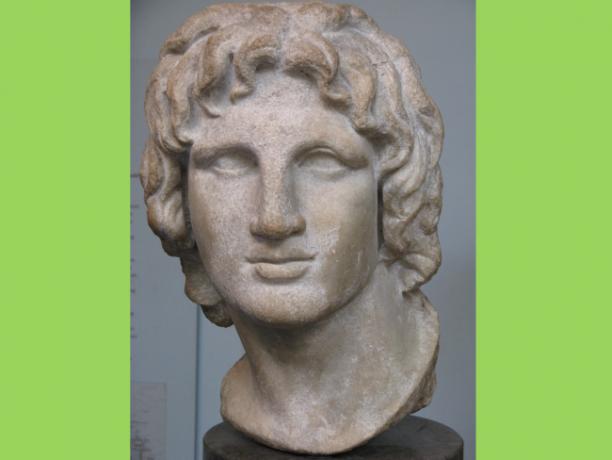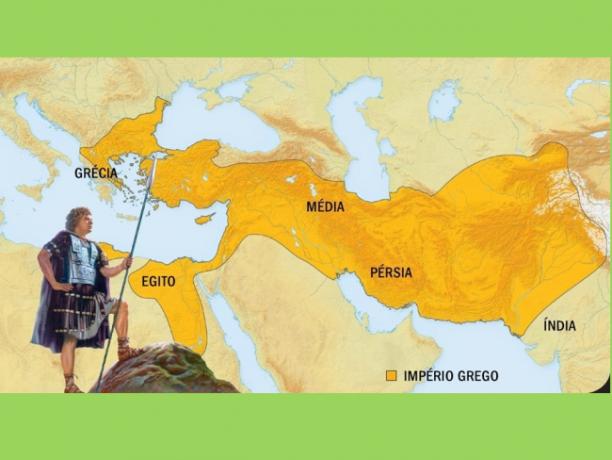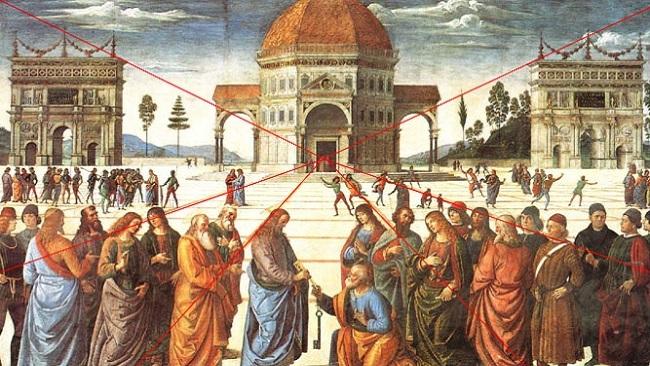Hellenism, also known as hellenistic period, was a period of history that represented the expansion of Greek culture, also called Hellenistic culture
During this period, Greece was under the rule of Macedonia, ruled by Emperor Alexander the Great, also known as Alexander, the Great. This period of expansion took place between 338 BC. C and 146 a. Ç.

Sculpture representing the face of Alexander the Great
The Macedonian emperor managed to expand the domain of Macedonia to all the cities of ancient Greece and ended up creating an empire whose core was the Greek culture.
In this way, all the Greek cultural influence was absorbed by Alexander, who began to spread it beyond the Balkan Peninsula.
Territory dominated by Hellenism
The expansion of Greek culture took place from the Mediterranean Sea to Central Asia, thus encompassing North Africa, the Persian empire (in the Middle East), Eastern Europe and India.

Map of the domain of Hellenism
Alexander the Great, who took over the Macedonian empire after the assassination of his father, Philip II, conquered the greatest empire that had ever existed.
Although the Greek language was adopted as the common language, there was a kind of cultural exchange between the nations and, with that, some institutions assumed the Greek pattern and others kept elements Orientals.
Expansion of Hellenistic Culture
Alexandria, an Egyptian city named after the Macedonian emperor, was the great hub of Hellenistic culture, especially with regard to the arts and literature.
The city was home to a famous papyrus scroll library, which contained at least 200,000 copies of works by ancient sages.

Ancient library of Alexandria, Egypt
Another place of great cultural prominence was the city of Antioch, capital of Syria.
Within philosophy, four new currents emerged: Cynicism, Stoicism, Epicureanism and Neoplatonism.
Learn more about the meaning of cynicism, stoicism and Epicureanism.
End of Alexandria Library
The best-known story about the end of the Library of Alexandria holds that in 642 Amir ibn Alas (then governor of the province of Egypt) has ordered that all works that are not in accordance with the Qur'an be burned.
Historians, however, defend another version of the famous library's demise.
According to them, the real end of the Library of Alexandria happened gradually and quite bureaucratically, and began with the cut in funds imposed by the Roman Emperor Marcus Aurelius.
This cut entailed the suspension of scholarships for library members and the expulsion of foreign academics.
Regarding the physical structure of the place, it is believed that it was already quite damaged due to several military actions that occurred frequently in the city that was often a camp of battle.
It is believed that when it was set on fire, the site consisted only of ruins in its structure and its collection.
According to historians, in fact practically all the existing material was burned, used as fuel in the furnaces that fed Alexandria's thermal baths.
The only works spared were those of Aristotle.
Importance of Hellenism in the arts and sciences
The Hellenistic period was of fundamental importance because the discoveries that took place during this period are still of great use today.
Check below how this period was essential for humanity.
Hellenism and the arts
The arts were only available to the noble class.
The architecture had oriental features, which became explicit with the appearance of the vault and arch.
Painting practically ceased to exist during Hellenism.
The representation of racial differences, pain, old age, anger and childhood through art emerged during this period.
Hellenism and Literature
Unfortunately, the Hellenistic literature was not preserved and, therefore, what remains today are just a few fragments of works.
The two most prominent names in literature acting in the field of poetry were callimachus (who wrote hymns, epigrams and two epic poems) and theocrit (Responsible for creating the pastoral genre.)
It was also during this period that the so-called new comedy, which represented the passions of common citizens and had Menander as its main representative.
Hellenism and Philosophy
The Hellenistic period was also important for philosophy.
In this period, the Western way of thinking, until then predominant only in Greece, began to be expanded to other places.
It was also during Hellenism that new philosophical schools such as the stoicism, O Epicureanism, O cynicism it's the skepticism emerged.
Learn more about the meaning of cynicism, stoicism and Epicureanism.
Hellenism and science
The scientific discoveries that took place in the Hellenistic period are still useful today.
During this period, the great mathematician Archimedes of Syracuse, who discovered integral calculus, the law of impulsion, and invented the planetarium and the aspiring bomb.
In the field of astronomy, Hipparchus of Nicaea gives the solar year a duration of 365 days and Aristarchus of Samos showed that the Sun was a central part of the planetary system.
In the field of medicine, Herophile was one of the most prominent names. Considered the founder of anatomy, he managed to distinguish, through his studies, the brain from the cerebellum, describe the duodenum, pancreas and prostate.
He was also responsible for discovering the pulse rhythm, establishing systole and diastole through mathematics.
End of Hellenistic Period
Alexander the Great had no children and due to the inexistence of heirs, after his death, the empire was divided among the generals who were under his command. Thus emerged three kingdoms: that of Ptolemy (Egypt, Phenicia and Palestine), that of Cassander (Macedonia and Greece) and that of Seleucus (Persia, Mesopotamia, Syria and Asia Minor).
These generals, in turn, preserved the administrative and cultural heritage inherited from the emperor.
However, Rome began to expand its powers and with that, assumed the domain of the territories that were before integral parts of the places conquered by the emperor, such as Syria, Egypt and the Macedonia.
Characteristics of Hellenism
Check below some of the main features of the Hellenistic period.
- Rise of Science
- Increased knowledge
- Physics growth
- Math progress
- astronomy development
- evolution of medicine
- Improved grammar
- geography development
Hellenism and Christianity
With the expansion of the Hellenistic culture, a vast territory began to incorporate aspects of Greek culture.
After the fall of Hellenism, the Romans took over the territories that previously belonged to Alexander the Great's empire, however, some cultural aspects, such as the Greek language, were preserved.
The influence of Hellenism on Christianity can be seen, for example, in the fact that the New Testament was written in Greek and not in Latin, which was the language of the new empire.
Given the vastness of the ancient Hellenistic empire, the spread of the faith by Christianity was quite successful since the language used was common to many territories, which facilitated communication between the peoples.
In this way, we can say that Christianity developed in a Greco-Roman context.

